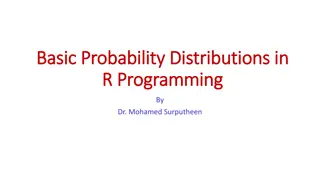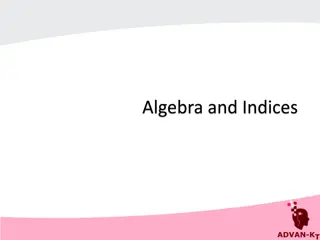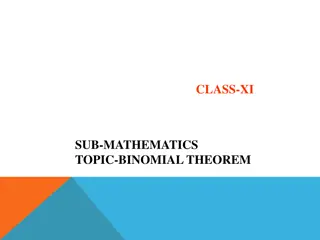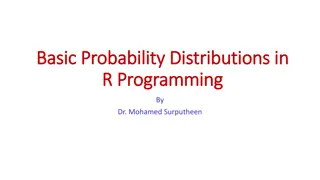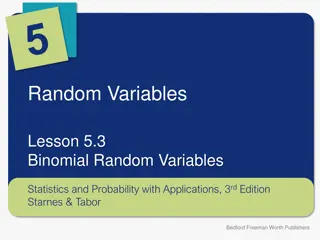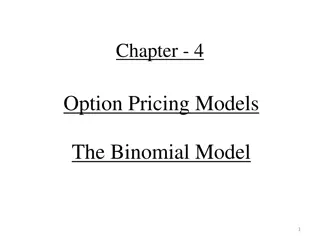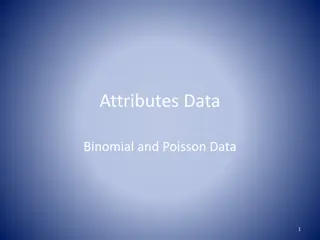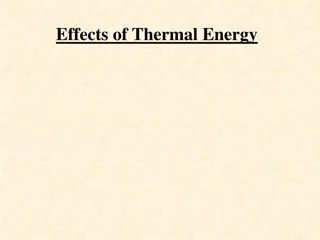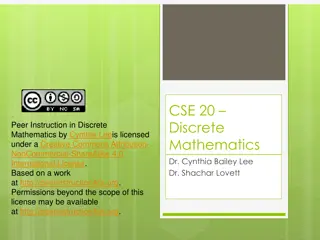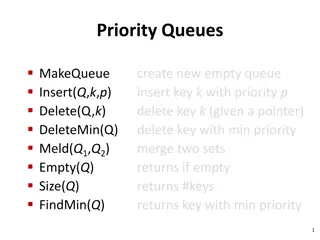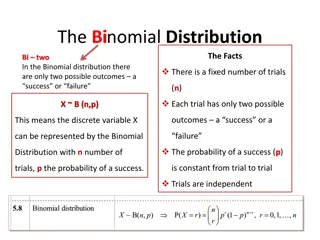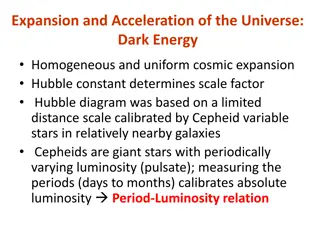
Advanced Techniques in Binomial Series Expansion
Explore higher-level applications of binomial series expansion, including negative and fractional powers, along with practical exercises to master the concepts. Dive into enriching your knowledge with the review and extension of binomial expansion. Discover simplified forms of the expansion and learn to find terms efficiently using mathematical methods.
Download Presentation

Please find below an Image/Link to download the presentation.
The content on the website is provided AS IS for your information and personal use only. It may not be sold, licensed, or shared on other websites without obtaining consent from the author. If you encounter any issues during the download, it is possible that the publisher has removed the file from their server.
You are allowed to download the files provided on this website for personal or commercial use, subject to the condition that they are used lawfully. All files are the property of their respective owners.
The content on the website is provided AS IS for your information and personal use only. It may not be sold, licensed, or shared on other websites without obtaining consent from the author.
E N D
Presentation Transcript
Further binomial Series expansion
Series BAT review the binomial expansion and extend to expansion of a negative or fractional powers using a series expansion of (1 + x)n KUS objectives Starter: write in index notation 1 ? 6 ?6 1 ? 7 6 (? 7)6 1 3?1/2 1 3?
WB 1 (review) a) find ? + ?? Always start by writing out the general form ? ??? ?? + ? ??? ???+ ? ??? ???+ + ? ??? ? + ??= ??+ Work out the fractions 1 + ?4= 1 + 4? + 6?2+ 4?3+ ?4 Every term after this one will contain a (0) so can be ignored The expansion is finite and exact
WB 1b (review) We use the substitution x -2x b) find ? ??? ? ??? ?? + ? ??? ???+ ? ??? ???+ + ? ??? ? + ??= ??+ It is VERY important to put brackets around the x parts Work out the fractions 1 2?3= 1 6? + 12?2 8?3 +
There is a shortened version of the expansion when one of the terms is 1 (1 + ?)?= n n n n r + + + ...... 1 1 2 2 1nx 1n 1n r rx 1n x 0 1 2 Whatever power 1 is raised to, it will be 1, and can therefore be ignored ( 1) n n ( 1)( 3! 2) n n n + + + 2 ...... 3 x 1 nx x 2! The coefficients give values from Pascal s triangle. (1 + ?)4= 1 + 4? + 6?2+ 4?3+ ?4 For example, if n was 4 ? + ??= ? + ?? +? ? ? ??+? ? ? (? ?) ??+ + ??? (??) ?! ?!
WB2a Find the first 4 terms of the Binomial expansion of a) (1 + 2x)5 b) 2 ?6 c) 2 ?6?) 3 + 9?5 ? + ??= ? + ?? +? ? ? ??+? ? ? (? ?) ??+ + ??? (??) ?! ?! 1 + 2?5 = 1 + 5 ?? +5(4) ???+5(4)(3) Put the numbers in ??? 2 6 Work out the arithmetic = ? + ??? + ???? + ???? +
WB2b Find the first 4 terms of the Binomial expansion of ?) 2 ?6 6 This needs rearranged 6 1 1 = 64 1 ? 2 ?6= 26 2? 2 Now do the expansion bit ? + ??= ? + ?? +? ? ? ??+? ? ? (? ?) ??+ + ??? (??) ?! ?! ? ? 6 1 ? = 1 + 6 ? +6(5) ? +6(5)(4) ? Put the numbers in 2 ? 2 ? 6 ? Work out the arithmetic +15 5 4?2 2?3 + = 1 3? Remember to multiply by 64! 6 64 1 ? = ?? ???? + ????? ?????+ 2
WB2c Find the first 4 terms of the Binomial expansion of ?) 2 2?4 This needs rearranged 2 2?4= 24 1 ?4= 16 1 ?4 Now do the expansion bit ? + ??= ? + ?? +? ? ? ??+? ? ? (? ?) ??+ + ??? (??) ?! ?! Put the numbers in 1 ?4 = 1 + 4 ? +4(3) ??+4(3)(2) ?? 2 6 Work out the fractions + 6?2 4?3 + = 1 4? Remember to multiply by 16! 16 1 ?4 = ?? ??? + ???? ????+
WB2d Find the first 4 terms of the Binomial expansion of ?) 3 + 9?5 This needs rearranged 3 + 9?5= 35 1 + 3?5= 243 1 + 3?5 Now do the expansion bit ? + ??= ? + ?? +? ? ? ??+? ? ? (? ?) ??+ + ??? (??) ?! ?! 1 + 3?5= 1 + 5 ?? +5(4) ???+5(4)(3) Put the numbers in ???+ 2 6 Work out the arithmetic = 1 + 15? + 90?2 + 270?3+ Remember to multiply by 243 243 1 + 3?5 = ??? + ????? + ??????? ????????+
Negative or fraction coefficients give INFINITE series when expanded ? + ??= ? + ?? +? ? ? ??+? ? ? (? ?) ??+ + ?????+ ?! ?! Goes on forever with increasing powers of x SO we usually give the expansion to a set number of terms Usually up to ?3 or ?4 We can only use the above expansion DO NOT use the expansion for ? + ??
WB 3 find the binomial expansion of up to the term in x3 a) ? ?? ? ?+??) ? Rewrite this as a power of x first ? + ? ? ? + ?= ? + ??= ? + ?? +? ? ? ??+? ? ? (? ?) ??+ + ??? (??) ?! ?! ? ? ? ??+( ?)( ?)( ?) ? + ? ?= ? + ? ? + ??+ ? ? + ? ?= ? ? + ?? ?? + (This is a useful one to remember it will come up again )
WB 3b find the binomial expansion of ?) ? ?? Rewrite this as a power of x first ? + ? ? ? ?? = ? + ??= ? + ?? +? ? ? ??+? ? ? (? ?) ??+ + ??? (??) ?! ?! ? ? ? ? ? ? ? ? ? ? ? ? ? ? ???/?= ? + ???+ ???+ ?? + ? ? ???/?= ? ? ? ? ? ? ?? ?? ?? ?? +
WB 4a find the binomial expansion of the following and state the values of x for which each is valid ?) Explain why ? = ? is not valid by substituting into your answer for (a) ? ??) ? ? ? ?? ? + ??= ? + ?? +? ? ? ??+? ? ? (? ?) ??+ + ??? (??) ?! ?! ? ? ? ? ? ? ? ? ? ? ? ? ? ? ??/?= ? + ??+ ??+ ? + ? ? ??/?= ? ? ?? ? ? ??? ?? ?? + Imagine we substitute x = 2 into the expansion ? (?)?/?= ? ? ?(?) ? ? ?? (?) + ?(?) = ? ?.???? ?.???? ?.???? + You can see the values fluctuate The result is that the sequence will not converge and hence for x = 2, the expansion is not valid
WB 4a (cont) state the values of x for which each is valid ?) ? ? ? ? = ? ? ?? ? ? ?? ?? + ??? Imagine we substitute x = 2 into the expansion ? (?)?/?= ? ? ?(?) ? ? ?? (?) + ?(?) = ? ?.???? ?.???? ?.???? + The values fluctuate. The result is that the sequence will not converge . and hence for x = 2, the expansion is not valid How do we work out for what set of values x is valid? The reason an expansion diverges or converges is down to the x term If the term is bigger than 1 or less than -1, squaring/cubing etc will accelerate the size of the term, diverging the sequence If the term is between 1 and -1, squaring and cubing cause the terms to become increasingly small, so the sum of the sequence will converge, and be valid ? < ? < ? is the same as ? < ? < ? or ? < ?
WB 4b find the binomial expansion of the following and state the values of x for which each is valid ?) ? ?+??? ? + ??= ? + ?? +? ? ? ??+? ? ? (? ?) ??+ + ??? (??) ?! ?! ? ? ? ? ? ? ? ? + ?? ?= ? + ? ?? + ???+ ???+ ? + ?? ?= ? ?? + ???? ??? ?? + The x term is 4x so the expansion is valid for ? < ?? < ? ? < ?? < ? is the same as ? ?< ? <? ? or ? <? ?
WB 5 Find the binomial expansion of ? ?? and by using ? = ?.?? find an estimate for ? ? + ??= ? + ?? +? ? ? ??+? ? ? (? ?) ??+ + ??? (??) ?! ?! ? ? ? ? ? ? ? ? ? ? ? ? ? ? ???/?= ? + ???+ ???+ ?? + ? ? ???/?= ? ? ? ??? ? ? ?? + Put x = 0.01 RHS = 1 0.01 0.00005 0.0000005 = 0.9899495
WB 5 (cont) Find the binomial expansion of ? ?? and by using ? = ?.?? find an estimate for ? ? ???/?= ? ? ? ??? ? Substitute x = 0.01 To BOTH sides ? ?? + RHS = 1 0.01 0.00005 0.0000005 = 0.9899495 ?/? ? ?? ??? =? ? LHS ? ???/?= ? = ? ??? LHS = RHS ? ? ?= 0.9899495 Rearranges to ? = 1.414213571
WB 6 use a binomial expansion to find an approximation to ??? give your answer to 5 decimal places 102 = An appropriate expansion is 1 + 2? 100 1.02 = 10 1.02 with ? = 0.01 ? + ??= ? + ?? +? ? ? ??+? ? ? (? ?) ??+ + ??? (??) ?! ?! Put the numbers in ? ? ? ? ? ? ? ? ? ? ? ? ? ? + ???/?= ? + ???+ ???+ ?? + ? ? + ???/?= ? + ? ? ???+? ? ?? +
WB 6 (cont) use a binomial expansion to find an approximation to ??? give your answer to 5 decimal places 102 = 10 1.02 and ? + ???/?= ? + ? ? ???+? ? ?? + with ? = 0.01 we get ? + ???/?= 1 + 0.01 1 20.012 +1 20.013 = 1.0099505 Remember to x10 102 = 10.099505 If you check with calculator this is accurate to 6 decimal places
BAT review the binomial expansion and extend to expansion of a negative or fractional powers KUS objectives self-assess One thing learned is One thing to improve is

